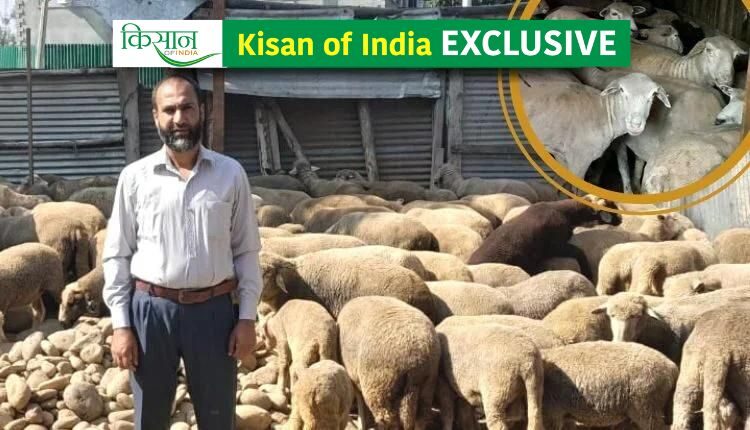Sheep Rearing gives profit of 7 lakh rupees per year
Mushtaq, who started work by rearing 15 sheep, has now become a brilliant expert
Mushtaq Ahmed Malik, who learned sheep rearing from only rearing 15 sheeps five years ago, is trying to improve his profile by not only breeding Indian sheep, but also including foreign breeds like Texel and Dorper. He has also started dreaming of preparing a breed to match the sheep. These magnificent breeds of sheep are from countries like Netherlands, Australia, South Africa and Canada, whose weight not only reaches up to 100 kg, but 85 percent of it is also suitable for use as meat. 38-year-old Mushtaq developed the ability for such a big dream in his latest sheep farming business. Thanks to this, within a few years, they have developed a sheep farm with the capacity of 200 sheep. The farm, built using scientific methods and local ingredients, currently houses 125 to 140 sheep.
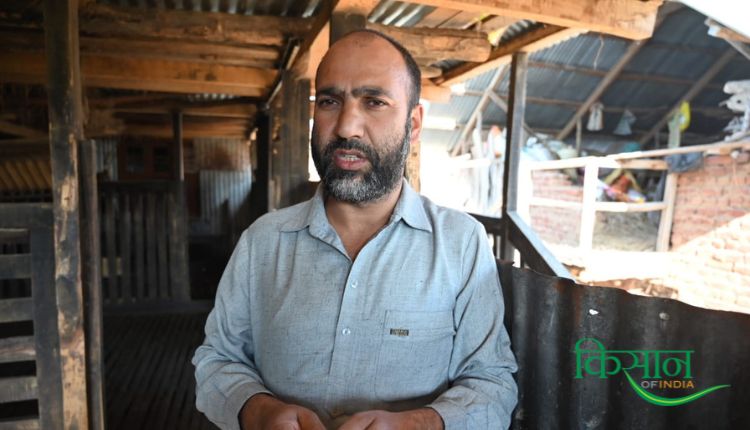
The science studies done in student life and the experience of working in a pharmaceutical company were of great use to Mushtaq Ahmed Malik of Darnadi-Mushpana village in Pulwama district of Kashmir. After doing B.Sc and then M.Ed in 2014, when the teacher’s job was not found in government school, Mushtaq worked as a medical representative in a pharmaceutical company and then in 2016 started the business by taking the franchise of Genetic Pharma of Gujarat. The work is still going well and he also has gardens in 32 kanal area, but the desire to innovate and earn more money took Mushtaq in another direction. This was sheep rearing and his first guru in this regard was his same friend who himself had also done the business of sheep rearing. Friend’s experience was of great use to Mushtaq. He started this work with Rs 1 lakh 75 thousand.
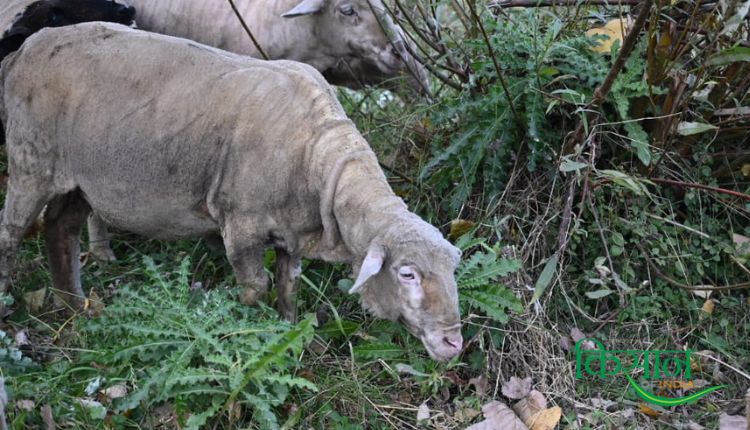
Mushtaq Ahmed Malik started sheep farming with 13 female and 2 male sheep between 2017-18. These were sheep of Kashmir Merino breed. Mushtaq starts talking excitedly only after asking about the sale of the first sheep. He says, ‘Within a year, he reared and sold the first sheep of Badi for Rs 19,500 and that too to the government i.e. Sheep and Animal Husbandry Department. Gradually, Mushtaq started learning the tricks of sheep rearing. He himself began to take care of the sheep. From diagnosing diseases to giving and injecting medicines. In this, his science studies and experience related to the medical profession proved useful. Two years later, he built a new sheep farm on the land adjacent to the house. It cost Rs 10 lakh. With this money, he also bought 125 sheep and he also got a subsidy of Rs 4.5 lakh as per the government scheme. Now because of this, he earns 7 lakh rupees in a year. Not only this, employment has also been given to two employees, to whom they pay a monthly salary of 10 thousand rupees. Now Mushtaq is thinking of having a third employee by increasing the work a little more. Mushtaq also considers this as an achievement of his work and says, ‘I am satisfied that not only am I getting profit, I am also becoming a means of providing employment to other people’.
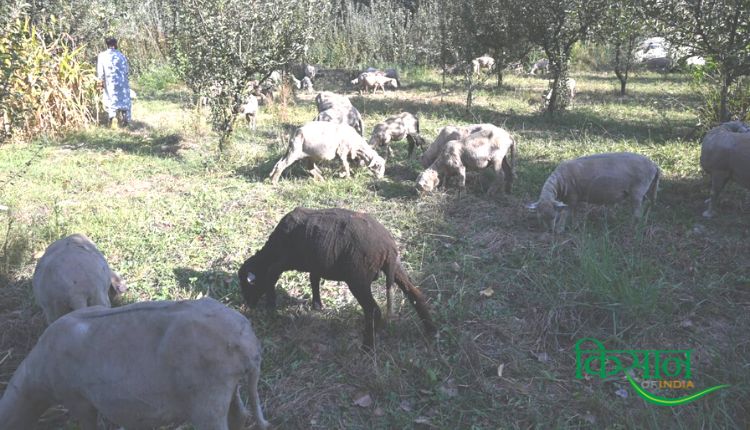
Mushtaq not only earns through sheep rearing and breeding, sheep dung is also useful to him. The farm that he has built for keeping sheep in two parts has two pools. There are sheep of different grades (with status) in 4 parts on the top floor. For example, young lambs are kept in a kennel with their lambs, pregnant sheep are kept in one shed and sheep that are in the advanced stage of pregnancy are kept in the third shed. In the fourth enclosure, those female sheep are kept with the male sheep, which are then capable of conceiving. The floor of this pool above is made of wooden planks of Keekar. There is a gap of a few centimetres between these strips so that the excreta and urine of the sheep does not accumulate on the floor and fall down through the crevices of the floor. It has two benefits. One is that the excreta and urine do not accumulate in the place where the sheep live in the shed. It does not cause odour and dirt. Along with this, the risk of spreading disease or any infection in sheep is also reduced. The second advantage is that the faeces and urine of sheep deposited on the bottom floor is converted into a kind of manure. This manure is used in his apple orchard. Sheep dung manure is considered very beneficial for these gardens.
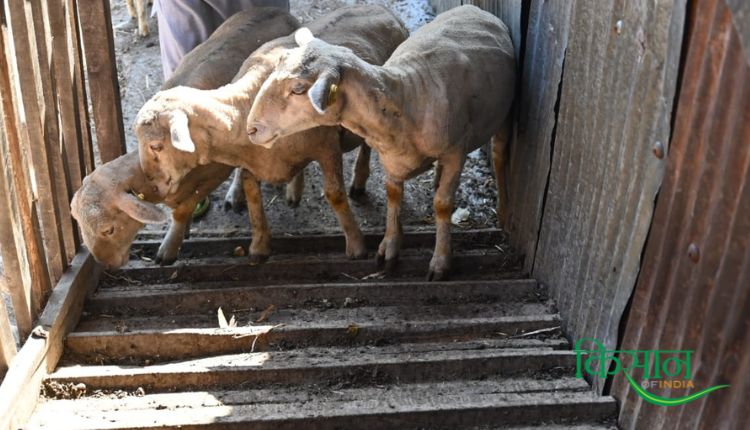
Mushtaq says that if we talk about sheep’s faeces and urine manure in his farm, then it is 1800 cubic square feet in a year, which will cost around 1 lakh rupees. A tractor-trolley filled with dung of almost every sheep is sold here for Rs 6000, which contains about 100 feet of cow dung. About 1,800 feet of cow dung accumulates in their farms in a year, but some sheep farms have forged exotic floors that look better than wooden floors. Mushtaq says that it is okay to put the floor in places with normal temperature, but in Kashmir the temperature remains low. The days of summer are short and those of winter are longer. Wooden floors do not get too cold. When the floor is too cold, the sheep get aborted. Having a wooden floor reduces this risk. Sheep are comfortable and healthy too. This also increases sheep production.
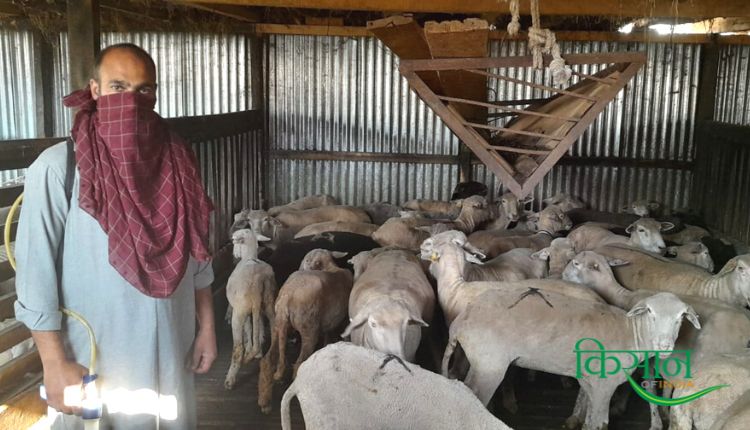
Mushtaq Ahmed is also assisted by his wife Ruhela Mujeed in the sheep rearing work. Ruhela loves their little lambs. When two breeds are crossed and as a result a beautiful lamb is born, then the interest and happiness of the family members also increases. Ruhela takes care of the lambs and falls in love with them. Ruhela says that when a lamb or sheep is sold, there is income, but it hurts due to the separation. On the other hand, Mushtaq Ahmed’s interest in this business has increased so much that he has become like a fertility scientist or specialist. It is said that they want to produce the best breed of sheep, but there is no such laboratory facility around here. For a long time, there are discussions on setting up a good embryology laboratory. If this facility is available, a lot can be done in the sheep breed improvement programme.
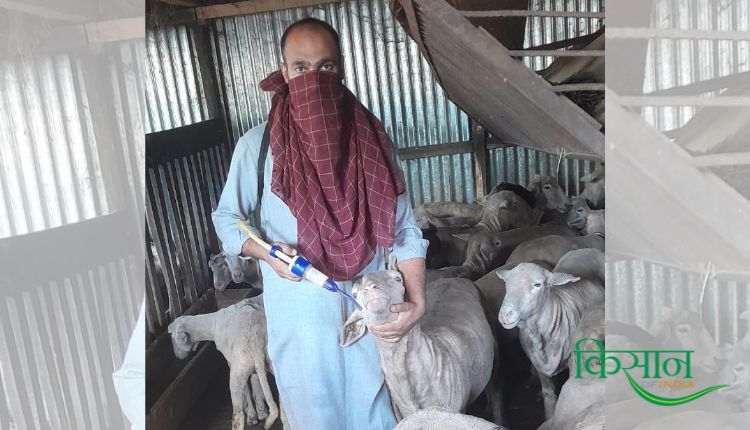
Earlier, sheep rearing in Kashmir was mainly for wool as there was a high demand for woollen and warm clothes in cold region. Also people used to drink sheep’s milk. Many people also used to eat sheep meat. Over a period of time, the schemes of the government have been such that instead of wool, rearing of sheep for meat started becoming a profitable deal. The demand for meat in Kashmir is so much that even meat of the sheep grown here started decreasing. Therefore, to meet its consumption in Jammu and Kashmir, sheep were imported from neighbouring states to Rajasthan. Now the sheep farmer tries to increase the maximum weight of the sheep. Therefore, they are interested in producing such breeds which are of high weight which will also fetch them a good price. One such breed is the Corriedale which gives a lot of wool. Also, there is enough meat in it. Mushtaq says that a sheep of this breed can weigh up to 100 kg. He had sold one such sheep for Rs 1 lakh. It took him two years to grow it. There is no use in Kashmir now in selling the wool of sheep. Rather, the man who takes off the wool from the machine has to be paid the amount of the wool taken from the sheep’s body.
Contact us: If farmers want to share information or experiences related to farming with us, then they can do this by calling us on the phone number 9599273766 or by writing an email to kisanofindia.mail@gmail.com or by sending your recording. Through Kisan of India, we will convey your message to the people, because we believe that if the farmers are advanced then the country is happy.

